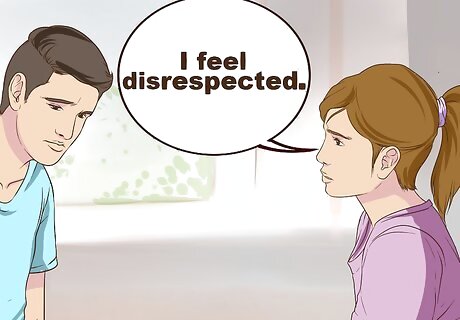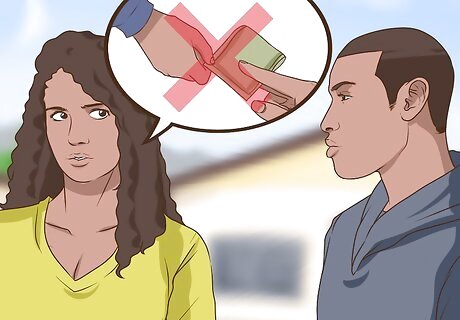
views
Addressing the Misuse

Recognize misuse or manipulative behavior. Being more aware of certain types of behaviors will help to decrease the chances of you being misused or manipulated by the other person. Some manipulation/misuse behaviors to watch for include: Rationalizing with you to get what they need. Many people who misuse other people because of their manipulative behaviors will often spend much time doing this. Rationalizing can be used as a way to further draw you into doing something you don't really want to do. Playing the role of the victim and blaming things on the other person. Manipulators will often blame you or others for their problems or issues, and avoid holding themselves accountable and taking responsibility for their own actions. Doing what they can to remain in full control. In conversations, manipulators may change the subject without you even knowing it and direct the conversation in their favor. People who often misuse others in this way will only give out partial information or make small changes to the information to convince you of something for their benefit. Reacting as if they do not know what you are talking about. Many manipulators will pretend to ignore requests and not listen to suggestions. Intimidating other people by framing situations to make them feel ashamed. Some will even make light of situations or problems and blame you for overreacting. Depending on the manipulator/misuser, they may be purposefully insulting and then try to pass it off as a joke, which can leave the person receiving the insult feeling horrible.

Stay calm when you react. When dealing with those who misuse you, it can be easy to quickly get emotional in the situation. If you're being used or treated in a spiteful fashion, your first inclination may be to lash out in response. However, those who antagonize others may thrive on the response they get. Try not to react in a way that will encourage their behavior. It is okay to feel what you're feeling. In fact, it's normal to feel anger, frustration, and sadness if someone is spitefully using you. However, try not to let these feelings control your reaction. To best address the situation, remain calm as you express yourself. You may not be able to immediately manage anger or other negative responses. Therefore, it may be best to walk away from a situation for a few minutes if you're feeling angry and address things later on when you're calm.

Explain how the behavior is affecting you negatively. You want to make it clear that being misused is not acceptable. When addressing misuse, make it clear to the other person how their actions affect you. Be respectful and calm, but do not sugar coat the issue. People, especially those with toxic tendencies, may not bother to think about how their actions affect others. Therefore, it's very important you be upfront about your feelings in these situations. Spell it out as clearly as possible for the person. For example, "When you ask to hang out and then have me drive you around while you run errands, I feel like I'm not important to you. It seems like you just want to use my car and don't really want to see me."

Use "I"-statements. When addressing negative behavior head on, you don't want to come off as confrontational. Toxic people who use others may be hostile to criticism and eager for an argument. Use "I"-statements to express yourself, which minimize objective blame and instead focus on personal feelings. "I"-statements have three parts. They begin with "I feel...", after which you immediately state your feelings. From there, you explain the actions that led to those feelings. Then, you explain why you feel the way you do. For example, do not say something like, "It's incredibly disrespectful when you blow me off all the time. You only hang out with me when you don't have plans with other people." You can rephrase this statement using an "I"-statement to make it sound less harsh. For example, "I feel disrespected when you blow me off to hang out with other people because it makes me feel like you only spend time with me as a last resort."

Ask the other person to share their feelings. Even if the situation is not your fault, you want to make sure the other person feels heard. When addressing negative behaviors, you do not want anyone to feel ambushed or attacked. After expressing yourself clearly, ask the other person to share how they feel in a respectful manner as well. Even if you feel like the situation is mostly the other party's fault, try to be fair. Remember, you're not admitting you're in the wrong simply by asking someone to share their feelings. You're just trying to keep a negative situation as respectful as possible. Say something like, "Anyway, that's what I'm feeling right now. Can you tell me how you're feeling?" If someone is being manipulative, do not open the door to their personal feelings. This could be an invitation for the manipulator to regain control of the situation or conversation and swindle you back into doing something you don't want to do out of guilt and shame. The person may also try to make you think they are the victim, and get their way.

Be the bigger person when someone will not back down. Even if you're respectful when you address the situation, a spiteful person may not back down. If the other person remains hostile or negative, you need to be the bigger person. Do not resort to any negative tactics the person uses, such as yelling or name calling. Instead, remain calm and walk away if necessary. Distance yourself from the person. You do not want to end up getting emotional and responding in a way that is not helpful. If someone continues to use you and violate your boundaries, work on seeing them less to avoid your own emotions taking over in a negative fashion.
Setting Clear Boundaries

Recognize your personal rights. If you've been used by someone for a long time, you may forget your feelings and boundaries are important. It's acceptable if you have certain limits and if there are certain boundaries you cannot tolerate. Think about interactions you've had with this person, especially interactions that have been extremely stressful and upsetting. Identify how and why you felt misused and what this says about your personal rights as an individual. It can help to think of negative interactions on a 10 point scale, with 10 being the most upsetting and one being the least. Think of interactions you would rate on a higher end and try to identify what personal limits were tested. For example, maybe your cousin borrowing a large sum of money to pay off their credit card and never returning it was a seven for you. Think about why this action was a seven. What personal rights were violated? Maybe you feel were taken advantage of, as you are generous by nature. You may also feel your hard work is not appreciated, as you work very hard to make your income and your cousin borrowed it without any regard for this. A boundary for you may be money. You may not be comfortable lending money to others. As money can easily build up resentment between loved ones, it's well within your right to say lending money to others is a personal limit of yours.

Go into the situation with realistic expectations. If interactions with this person have been negative in the past, things are unlikely to change now. It's important to state your boundaries for your own well being and so you feel heard. However, do not have high expectations that this person will listen. Keep in mind that, while it's worth a try, a negative reaction is somewhat likely.

Be direct when laying out boundaries. You want to get straight to the point when setting boundaries with a difficult, negative person. You're not doing yourself or the other person any favors by not stating yourself clearly. If someone is the type to ignore boundaries, it's especially important to be direct so they understand where you're coming from. For example, do not say something like, "I just feel kind of uncomfortable lending out money. Could you not keep asking me?" Instead, be clear about what you feel, why you feel that way, and your limitations. For example, "I work really hard for my money and I feel lending to family members can build resentment. I'm sorry you're having financial issues, but I can't help you out financially anymore. That's a personal limit for me." Remember that no means no, so make sure to enforce your limits. Learn to accept that it is okay to say “no.” Stay firm and follow through with your boundaries. Many manipulative people (whether it is their conscious intention or not) are highly skilled at swaying others to change their boundaries to fit their needs, and they can make you feel guilty because they are not getting what they want.

Walk away if the person is not receptive. Remember, someone who spitefully misuses others may not take well to you setting boundaries. Even after you've stated your case respectfully, they may continue to question you or disregard your feelings. For example, they may say something like, "Don't you think it's kind of petty to be so caught up on money? If I could lend you money, I would." If the person is simply not listening, it's okay to walk away for now. End the conversation if things are getting hostile. If someone is simply badgering you after you've made your boundaries clear, quickly find a way out of the conversation. For example, say something like, "We're not seeing eye to eye on the money issue and I'm not sure we're going to. I think we should drop it." From there, you can find an excuse to leave. For example, "I need to meet a friend now so I'm going to leave."
Handling Interactions in the Future

Recognize what traits make you vulnerable. While it's never your fault that someone took advantage of you, you may have certain traits that make you vulnerable to toxic people. Becoming aware of these traits can help you recognize and stop the pattern of misuse in the future. Toxic people often target those that are very accommodating to others. Do you frequently try to help others, even at the expense of yourself? If so, try to understand this inclination. This can help you better recognize this urge in the future and allow you to set more reasonable boundaries. For example, maybe you crave acceptance from others and try to win favor by being agreeable. In the future, remember people should accept you for your personality, generosity, and other positive traits instead of trying to get people to accept you simply for being accommodating.

Manage your reactions carefully. After addressing the misuse, it may continue. Toxic people generally continue violating boundaries, even after being confronted. If the person in question is a family member, co-worker, or someone else you have to interact with on occasion, work on keeping your emotions together. Remember, you cannot control another person's actions but you can control your reaction. Do not continue to react in ways that encourage the behavior. Do not, say, get angry, emotional, or become overly accommodating to avoid negative feelings. Instead, work on remaining calm and emotionally disengaging. You are not to blame for someone else's actions. The best you can do is focus on prioritizing yourself and your own needs.

Restate boundaries periodically. People who use others may not listen the first time you state your boundaries. Therefore, it may be necessary to restate them on occasion. A negative person may try to get you to go back on boundaries you've set. If this occurs, remind them of your limitations. For example, "We already discussed this. I don't lend money to family."

Refuse to engage with negative behavior. You do not have to engage with someone who is behaving in a negative fashion. If the person who uses you acts out when you refuse to meet their demands, simply disengage. Do not return text and phone calls. Do not be roped into an argument. Minimize interactions as much as possible to avoid being dragged into someone's negativity.
Care for yourself. If someone is using you and being difficult, it's important to care for yourself. Take steps to make sure you get the support and care you need after someone has hurt you. Make sure you eat right, get enough sleep, and get adequate exercise. If you're feeling really bad, do something you like at the end of the day, like watching a movie or TV show you like. Interact with positive people. If you've been treated poorly by a negative person, seek out the company of people who make you feel good about yourself.



















Comments
0 comment